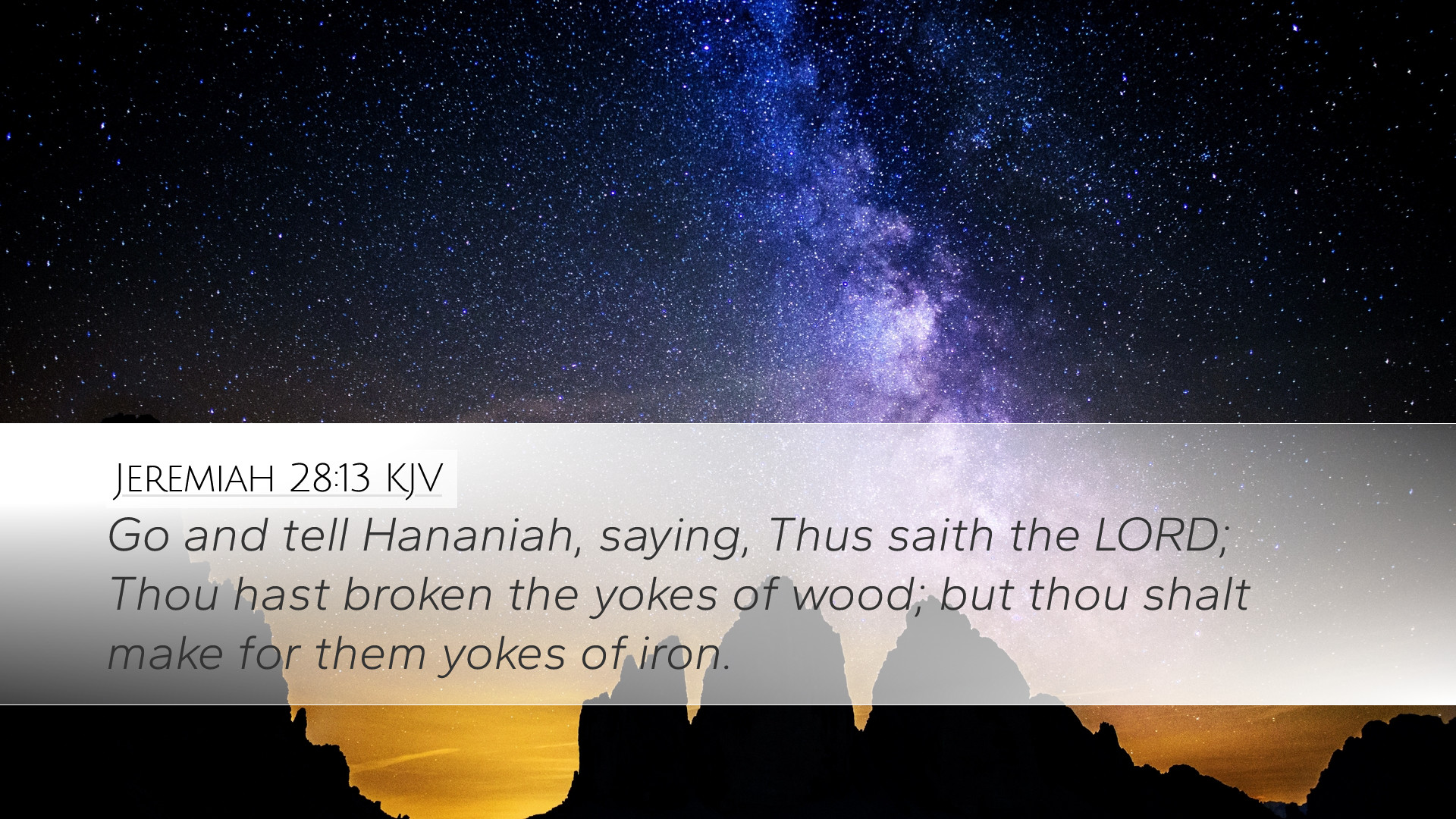Bible Commentary on Jeremiah 28:13
Verse Context: Jeremiah 28:13 states, "Go and tell Hananiah, saying, 'Thus says the Lord: You have broken the yoke of wood, but you have made in its place yokes of iron.'"
Introduction
This verse occurs in a critical moment in the life of the prophet Jeremiah, challenging the false prophet Hananiah’s claims. Through this passage, God asserts the truth of His sovereign will, especially concerning the plight of Judah in the face of impending Babylonian dominance. The commentary provided here draws from notable public domain sources, including Matthew Henry, Albert Barnes, and Adam Clarke, aiming to illuminate the underlying theological themes and pastoral applications of this scripture.
Verse Analysis
Jeremiah 28:13 addresses the conflict between God’s truth as proclaimed by Jeremiah and the false prophecies of Hananiah. The Lord's message indicates that while Hananiah claimed a lightening of the people's burdens, in reality, he only increased them. The imagery of yokes serves a dual purpose: it presents the realities of oppression and indicates the seriousness of turning away from God’s truth.
1. The Role of Prophets
Matthew Henry notes that prophets are called to speak truth and uphold God’s Word. This responsibility demands discernment, especially in a time when false narratives are prevalent. Jeremiah’s obedience to convey God’s message to Hananiah illustrates the weight of prophetic responsibility and the danger of misrepresenting divine lines of authority.
2. The Symbolism of Yokes
In this verse, yokes symbolize servitude and oppression. Hananiah's proclamation of breaking wooden yokes contrasts profoundly with God's declaration that iron yokes will now replace them, embodying a deeper, increased bondage. Adam Clarke interprets the iron yoke as a reference to the more severe consequences of straying from God’s designs, emphasizing that the false hope of deliverance can lead to even graver yokes being imposed.
3. The Nature of False Prophecy
Albert Barnes expounds on the nature of false prophecy, highlighting that false prophets often promise peace and security without grounding in God’s truth. This reflects a universal challenge within the church and encourages introspection on the sources of our spiritual leadership. The weight of this passage serves as a warning against complacency in faith and a reminder to critically evaluate the messages that one receives.
Theological Implications
The verses surrounding Jeremiah 28:13 offer several theological implications for understanding God's communication with His people.
- Divine Judgment and Sovereignty: The verse reinforces the notion of God's sovereignty amidst human conflict. Just as Jeremiah faithfully relayed God's message, believers are called to uphold His truths regardless of cultural or societal pressures.
- The Nature of True Peace: Henaniah's message of peace served as an allure for the people of Judah who were looking for relief. True peace, however, can only be attained through obedience to God's will, something Jeremiah’s message emphasizes.
- Human Authority vs. Divine Authority: The stark contrast between human proclamations and divine truth invites deeper reflection on where authority lies within spiritual matters. Jeremiah serves as a prophetic voice, highlighting the necessity of dependence on God's authority over mere human opinion.
Pastoral Applications
This passage speaks profoundly to pastors and church leaders today.
- Discernment in Leadership: This scripture invites pastors to exercise discernment in their leadership roles, ensuring that the messages presented align with scripture.
- Commitment to Truth: Church leaders must remain steadfast in presenting God’s truths, even when they encounter opposition or the allure of messages that promise ease and comfort without accountability.
- Encouragement to the Congregation: Pastors should encourage their congregations to engage personally with the Word of God. Building a community that seeks truth will help guard against the influences of false prophecies that divert attention from God’s real heart and intent.
Conclusion
Jeremiah 28:13 serves as a poignant reminder of the continual need for adherence to God's truth, particularly in a world filled with competing ideologies and voices. The insights provided by Matthew Henry, Albert Barnes, and Adam Clarke collectively emphasize the importance of discerning true prophetic voices and understanding the implications of leadership in the faith community. As believers, we are called to uphold God's divine counsel and resist the comfortable temptations of falsehood, remaining steadfast in our journey of faith.


